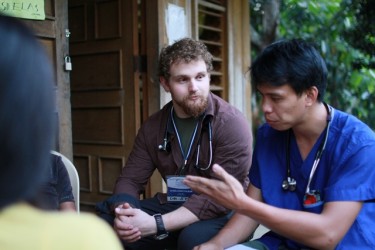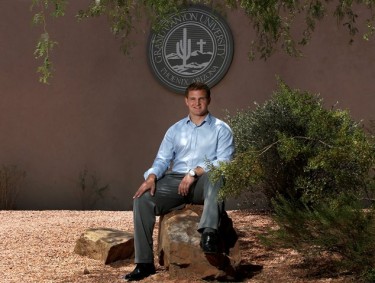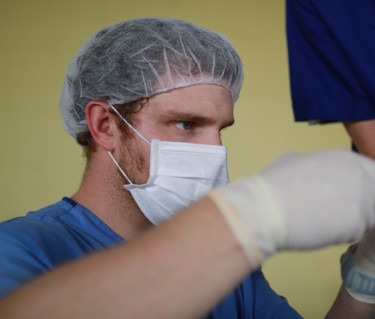Story by Cooper Nelson
GCU Today Magazine
As Dr. Stuart Harris walked down the brick Promenade connecting Grand Canyon University’s entrance to the heart of the Phoenix campus, he reminisced about how the University molded him into the man he is today.
It had been years since Harris, 27, last saw Brazell Stadium, where he played catcher for the Antelopes baseball team, or the Tell Science classroom building, where he studied human biology and chemistry en route to graduating in 2009 with a bachelor’s degree in human biology.
After graduation, Harris briefly pursued a master’s in biomedical science at Central Washington University, then entered Pacific Northwest University’s College of Osteopathic Medicine and graduated in May. During medical school, he served on three international medical mission trips — to the Philippines in 2011, Belize in 2013 and back to the Philippines in March.
In the Philippines, he served with doctors and nurses from Reach International Healthcare and Training, Inc. which provided free clinical care to and performed minor surgeries on indigenous people with little or no health care.
But Harris, an academically accomplished doctor of osteopathic medicine, cared little about his studies when he arrived at GCU in 2005 to play baseball. He hadn’t applied himself in high school in Liberty Lake, Wash.
However, after being denied by the NCAA Clearinghouse, which grants eligibility to compete in collegiate athletics, Harris turned his focus to his coursework. A classroom lecture during his sophomore year was a defining moment in his academic success.
“I went from this person who was totally focused on sports to this person who was focused on academics and getting involved in my community and serving other people,” he said.
“The culture at GCU and the professors I had really impacted who I would become. If I didn’t go to GCU, I don’t think I’d be where I am today.”
Grand guidance
Harris came to GCU on a leadership scholarship and walked on to the baseball team. He was bright, but his focus was on athletics, not academics. He redshirted as a freshman and received an athletic scholarship his sophomore year. His baseball career was stymied his second season when he was relegated to third string after strong competition at his position.
Being denied by the NCAA Clearinghouse steered his focus toward the classroom, and Harris found his competitive drive for athletics bled over onto his academics. In 2006, Harris took a seat in the front of Dr. Russell Grubbs’ Organic Chemistry 1 lab.
“This class won’t be easy and half of you won’t be here come midterms,” Grubbs told the class on the first day. “But I promise you that if you work hard and put in the time, you’ll succeed.”
Harris didn’t know it then, but these words would impact his life for the better.
“My class was tough, and when Stuart took Organic Chemistry 1, he got a B,” said Grubbs, noting most students drop a letter grade in Organic Chemistry 2, which often leads to them failing the program.
“He returned the next year and got an A,” Grubbs said. “After that, I knew he had a special drive and would go on to do great things.”
Harris graduated cum laude in 2009 and credits his academic success to his professors, many of whom he remains in contact with today. He was a member of several academic clubs and played two seasons for the inaugural men’s lacrosse team. He earned Division II lacrosse Academic All-American honors as a senior.
Daniel Tussy, his college roommate and former lacrosse teammate, said Harris often studied into the early morning but was always up hours before practice for additional coursework. He was “on a different level,” Tussy said.
“Stu had a great disposition about him. He cared about other people and was also smart,” he said. “Everything he did (was) to be successful and serve others later in life.”
Serving others
It was March 2014, and Harris was on his second medical mission to Mindanao Island in the Philippines. As he and a handful of Reach medical missionaries lay in sleeping bags beneath mosquito nets, sheets of rain pummeled the tin roof of their bamboo shack, nestled in a small Aboriginal tribal community in the isolated mountains.
Near midnight, Harris, a Reach doctor and nurse, and a cameraman abruptly awoke to frantic screams and pounding at their door.
A local man had crashed his motorcycle while trying to traverse the steep, winding mountain roads. Blood dripped from multiple deep lacerations on his face and mouth. Being nearly four hours from the nearest hospital — eight hours in the rain — Harris and the others brought the man inside and began operating. After a short time, he was sent home, bruised and bandaged, but alive.
The incident occurred during Harris’ third week of a monthlong journey to provide medical treatment to the country’s indigenous people. More than 6,000 had been killed in 2013 in Typhoon Haiyan, and many survivors lived hours from hospitals and doctors.
While in Mindanao, Harris and Reach missionaries provided free clinical care to more than 1,300 people and performed 63 free minor surgeries, from removing cysts to treating dental abscesses. Harris also distributed 48 water filters, enough to provide an estimated 48 million gallons of clean drinking water, through the nonprofit organization Waves for Water.
Harris, who made mission trips a priority after graduating from GCU, wanted to make the Mindanao journey a humanitarian experience. He became a clean-water courier for Waves for Water and distributed filters to areas without running water to combat sickness caused by water contamination.
Harris asked for donations via social media and relayed his work to those who donated through daily blog posts and weekly videos as part of his personal project, Reach for the Philippines #TeamSTU. His goal is to encourage people in the United States who can’t help abroad to make an impact at home.
“I have a personal quote that I say to myself daily: ‘You can’t save the world; all you can do is your best. Though, be assured if you hadn’t, the impact would be that much less,’” Harris said.
He plans to create annual humanitarian-focused, international medical mission trips after completing his current residency at Community Memorial Hospital in Ventura, Calif.
“I encourage people to do what they can to help, even if it’s just in their community,” he said. “Too often we forget about the person who needs help right next to us."
Contagious giving
In February, Harris and one of his best friends from Washington, Brad Ferguson, reunited. Ferguson, who owns Zen Studios, which creates short documentary-style videos, had heard about Harris’ international medical mission trips and asked to join the March trip to the Philippines.
Ferguson produced a short film about the trip for Reach to use as a promotional video for future outreach, and he donated all of its proceeds — expected to be nearly $31,000 — to the nonprofit.
Ferguson, who was in the shack the night of the motorcycle accident, raved about Harris’ “impressive skill and poise.” He admires Harris’ intelligence and kindheartedness.
“He always had this special drive, and I think what he did in the Philippines and the fact that he is a doctor is a testament to the impact he has made,” he said.
“Only a special person is able to do the things Stu does.”
Contact Cooper Nelson at 602.639.7511 or [email protected].






































































